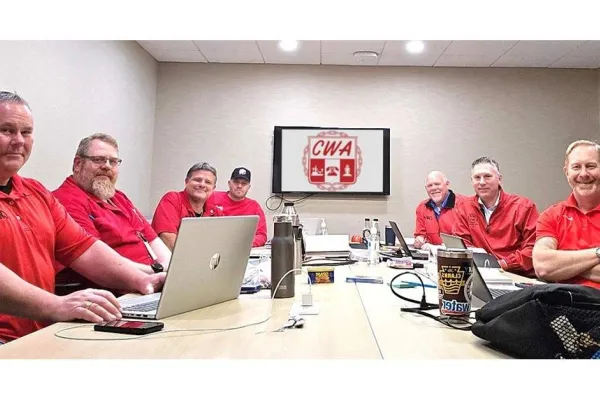California has been hardest hit by AT&T's call center closing and downsizing
For Immediate Release: Thursday, May 4, 2017
Contact: Sarah Ford; 812-243-7152; [email protected]
Desmond Lee; 646-517-1826; [email protected]
As 21,000 AT&T workers prepare for potential nationwide strike,
New Report Pulls Back the Curtain on AT&T’s Vast Network of Offshored Call Centers
Analysis reveals that workers and customers are paying the price for the company’s race to the bottom, with California communities among the hardest hit by job cuts
WASHINGTON — As AT&T faces growing pressure on multiple fronts – from Wall Street investors to frontline workers, a new report released today by the Communications Workers of America (CWA) provides an unprecedented window into the company’s sprawling web of 38 third-party call centers in eight countries that are driving a race to the bottom for low wages and compromising quality service for millions of AT&T customers.
This week, AT&T workers and CWA representatives are meeting with call center vendor employees in the Dominican Republic to learn more about what has happened to the jobs AT&T has shipped overseas and the anti-union backlash facing Dominican workers who attempt to improve conditions. During the Verizon strike last year, CWA representatives uncovered a massive offshoring operation in the Philippines, and were confronted by armed security while seeking a meeting with Verizon management.
In California, the company has shut down five call centers since 2011, resulting in the loss of nearly 1,000 middle-class jobs across communities such as:
- Anaheim
- Bakersfield
- Atwater
- Sacramento
- Oakland
Over the past six years, the company has also slashed a significant number of call center jobs in San Ramon, Fresno, San Diego, Commerce, Pasadena, Escondido, and Torrance.
“AT&T’s offshoring practices are the ultimate ‘lose-lose’ scenario for everyone involved – the U.S. communities devastated by the loss of good jobs, the contracted workers subject to harsh working conditions and unreasonable demands, and the millions of AT&T customers forced to deal with compromised service standards,” said Tom Runnion, Vice President of CWA District 9. “Once again, AT&T is putting corporate greed ahead of its responsibilities to its workforce and its customers, dragging us down a race to the bottom just to add a few more dollars to its war chest.”
The report draws on interviews and surveys of hundreds of workers in the U.S. and the global call center workforce, who detailed the harmful impact of AT&T’s offshoring on workers and customers. The study also highlights the stories of U.S. communities that have been devastated by call center closures, including Ridgeland, MS, Atwater, CA, and Pittsburgh, PA.
“Good jobs in the U.S. and quality service that customers pay top dollar for shouldn’t be a stretch for the largest telecom company in the U.S.,” said Dennis Trainor, Vice President of CWA District 1. “From Pittsburgh to Bakersfield, AT&T has shuttered dozens of call centers, stripping communities of thousands of jobs that are shipped over to vendors in the Dominican Republic, the Philippines and other countries. At the bargaining table and on the practice picket lines, AT&T workers are committed to protecting good jobs here at home.”
Since 2011, AT&T has eliminated 12,000 call center jobs in the U.S., closing and downsizing call centers across the country. Rather than keeping those good-paying jobs here at home, AT&T has contracted with third party vendors operating in countries with low wages and weak labor protections. One of these vendors, call center giant Convergys, earns $600 million in revenue from AT&T each year.
“When AT&T closed my call center in Bakersfield, I worked too many years at AT&T to start over and not enough to retire, so I was forced to take a transfer two hours away in Pasadena so I could keep paying my bills,” said Pam Suniga, a 20-year AT&T wireline residence service representative whose call center in Bakersfield, Calif. was closed in 2015. She now lives in Los Angeles. “I’m living in a rented room far away from my family and have to keep missing my grandkids’ birthdays, school plays and other precious moments that I’ll never get back. I never thought that my life would look like this as a grandmother and after years of dedicated service to AT&T.”
Findings from the study also underscore the risks offshoring poses to AT&T customers, and the company’s own long-term success:
- Employees at AT&T vendor call centers face inadequate training and intense pressure to reach unrealistic quotas – making it difficult to meet customer’s needs.
- In several cases, vendor employees have engaged in misconduct that put customers at risk. Workers at AT&T vendors in Mexico, Colombia, and the Philippines sold the names and full or partial Social Security numbers of hundreds of thousands of U.S. customers, prompting a record fine by the FCC.
- In a survey of AT&T workers in the U.S., 85 percent said that they have to solve customer problems caused by overseas vendors several times per week. Vendors often provide inaccurate information, fail to solve problems, offer credits or promotions that cannot be honored, and enroll customers in services they did not request.
“AT&T’s excessive and greedy offshoring has a ripple effect across communities here at home and around the world,” said Carissa Moore, a call center worker in Bothell, Washington. “Instead of investing its billions in good jobs and quality customer service, AT&T is funneling jobs out of our communities to countries that allow them to pay workers next to nothing and drive down the level of customer service. I’m tired of being taken advantage of by AT&T and fearing my job is next on the cutting block. It’s long overdue that AT&T take some accountability and keep our jobs in U.S. where they belong.”
While workers and communities in the U.S. are reeling from the loss of family-supporting jobs, employees at AT&T’s vendor call centers face low wages and exploitative working conditions:
- In the Philippines, workers at four AT&T vendors earn the equivalent of $1.60 to $2.05 per hour for a 40-hour week. Many say their wages are inadequate to meet basic needs, and wages are expected to decline even further due to an increase in the labor supply.
- In the Dominican Republic, workers at vendor centers are have faced severe retaliation for advocating for their right to form a union.
- In El Salvador, workers earn the equivalent of $2.36 to $3.41 per hour and most rely on other members of their household to make ends meet. Nearly all the workers interviewed reported credit card debt or personal loans.
As AT&T comes under fire at the bargaining table for offshoring thousands of jobs, workers are rallying around new federal legislation that would penalize companies like AT&T who offshore call center jobs. Last month, in more than 60 locations, hundreds of CWA members and AT&T workers held rallies, met with members of Congress, and wrote letters in support of the U.S. Call Center Worker and Consumer Protection Act, bipartisan legislation to keep good jobs in the U.S.
Today’s report marks the latest in a series of controversies for AT&T. In April, UC Berkeley’s Haas Institute for a Fair and Inclusive Society released a groundbreaking report revealing stark income disparities in the roll out of AT&T’s fiber network. The analysis found that early deployment of the company’s “gigapower” all-fiber service in California is concentrated in wealthier communities – leaving lower-income neighborhoods with significantly slower speeds.
The company has also faced criticism for deceptive business practices at “authorized retailers,” lack of investment in infrastructure, and phone outages that leave callers unable to reach 911 during emergencies.
At its annual shareholder meeting last week, AT&T wireless workers announced they had given the company 72-hours’ notice to end their contract extension. After months at the bargaining table, a strike appears more likely than ever before for 21,000 wireless workers in 36 states and DC. Emboldened by a successful 17,000-worker strike in March, AT&T wireline workers on the West Coast are calling for the company to settle a fair contract with renewed strength and a unified commitment to protect good, middle-class jobs in California and Nevada. Additionally, 2,300 DIRECTV workers in California and Nevada – now part of AT&T following a recent merger – have been in negotiations for their first contract since April 2016, and hundreds of workers at AT&T East who manage the 911 dispatch system for AT&T have also worked without a contract for over a year.
CWA and Labor Allies Win Political Victories Across Texas



